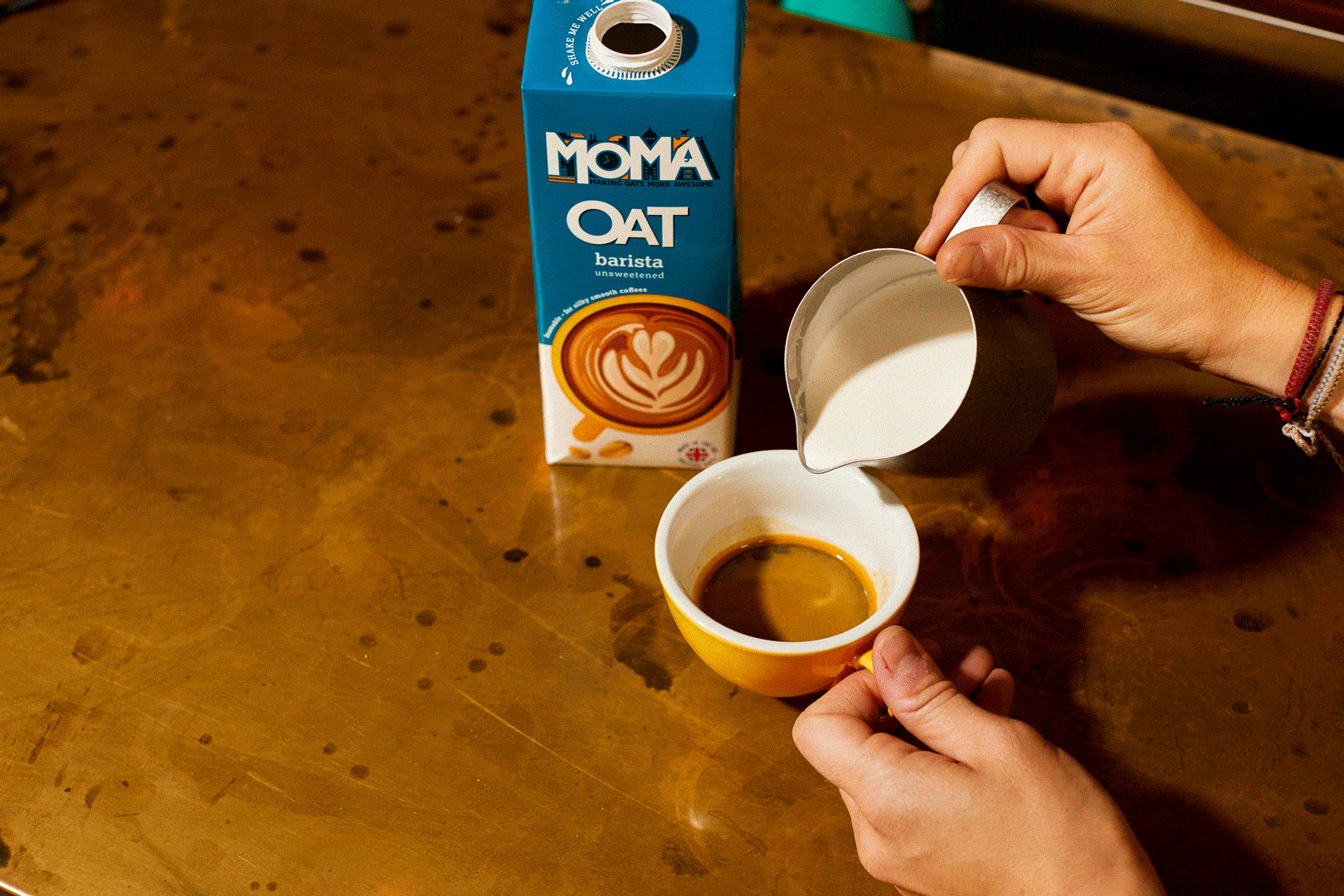Tue 19 Mar 2024 • World Coffee Portal
1.4 Billion Reasons to Sell Coffee

SHARE THIS POST
China's Coffee Revolution: Opportunities and Challenges Ahead
A country of colossal proportions, huge opportunity and beguiling complexity, traditionally tea-drinking China is now re-writing the coffee business playbook. 5THWAVE delves into China’s coffee shop miracle to explore the new wave of operators spurring global innovation, how international brands can achieve success – and what Chinese consumers really want
In December 2023 World Coffee Portal broke the story that China had overtaken the US as the largest branded coffee shop market on the planet after growing a whopping 58% in 2023 to reach 49,691 outlets.
The huge opportunities for coffee businesses among China’s 1.4 billion citizens are undeniable. More than 90% of Chinese consumers surveyed in the report drink hot coffee weekly and 64% consume iced coffee at least once a week. Indicating the role of coffee shops in driving overall coffee consumption, 89% of consumers surveyed visit or order from a coffee shop at least once a week, with a fifth doing so daily.
COFFEE’S NEON ALLURE
Since China began opening up its economy in 1978, GDP growth has averaged 9% every year. The so-called ‘economic miracle’ saw China overtake Japan as the world’s second-largest economy by GDP in 2010, with a 2022 IMF report judging China’s economy to be some 23% larger than the US by Purchasing Power Parity (PPP).
For many Chinese citizens economic liberalisation brought greater prosperity – and their first taste of Western fast food and café culture. KFC opened its first Chinese branch in Tiananmen Square in 1987 and McDonald’s followed with a Beijing store in 1992.
From the golden arches to the green siren, in 1999 Starbucks became the first major Western coffee chain to launch in China, with Costa Coffee following in 2006, Dunkin’ in 2008 and Tim Hortons in 2019.
“China is the most compelling consumer market in the world, not just because of its size, but because it’s the most demanding, the most dynamic and the most digital,” says Yongchen Lu, CEO of Tims China, the joint venture that manages more than 900 Tim Hortons stores in China.
Today, China’s branded coffee shop market is a melting pot of international domestic operators, led by Luckin Coffee’s 16,200 digital-first locations and Starbucks’ 7,000 stores. International operators may have primed the market but today more than 80% of coffee chains in China are domestic brands.
Despite China pursuing its zero-Covid strategy into early January 2023 – almost a year longer than most major economies – the market has since regained significant momentum. Seventy-two percent of industry leaders surveyed by World Coffee Portal in November 2023 indicated trading was improved or comparable to the previous year. Sixty-five percent agreed footfall had recovered to pre-pandemic levels.
“THE BUSINESS ENVIRONMENT IN CHINA HAS BECOME MUCH MORE STRAIGHTFORWARD THAN IT WAS YEARS AGO”
Martin Pollack, CEO, Torch Coffee
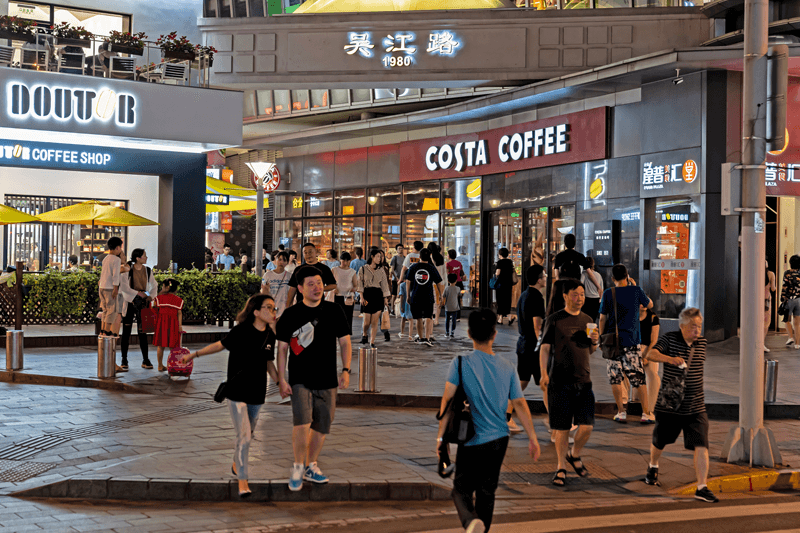 Japan’s Douter and the UK’s Costa Coffee trading side-by-side near Shanghai’s Jing'an District Photo credit: Joseph GTK / Shutterstock
Japan’s Douter and the UK’s Costa Coffee trading side-by-side near Shanghai’s Jing'an District Photo credit: Joseph GTK / Shutterstock
“Coffee is becoming a daily ritual for many Chinese coffee consumers. With recent strong price competition in the market, coffee is developing beyond an ‘aspirational lifestyle product’, particularly in the highly developed east coast provinces where the market is most mature,” says Felipe Cabrera, General Manager of Shanghai-based Ad Astra Consulting, commenting on China’s coffee industry.
China’s already vast and fast-growing economy means coffee chains need only turn to one of the country’s 18 cities with more than five million people – or the five with more than 10 million.
With a population of 22 million, Shanghai is the epicentre of China’s flourishing coffee shop market. There are estimated to be more than 8,000 coffee shops in the vast city according to a mid-2022 report by food delivery company Meituan, which would make it among the most densely populated coffee metropolises on the planet.
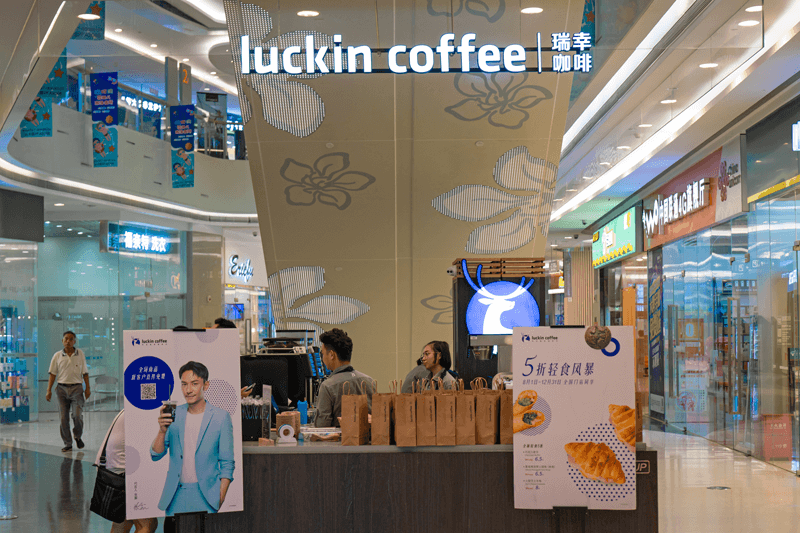 A small format Luckin Coffee store in Wuhan, ChinaPhoto credit: Shutterstock
A small format Luckin Coffee store in Wuhan, ChinaPhoto credit: Shutterstock
SEND MORE COFFEE
Despite breath-taking outlet growth, China’s total forecast coffee consumption of five million 60-kg bags for 2024 pales in comparison to the 20 million consumed in the US every year. However, while coffee consumption in the US and Europe is growing around 4% annually, the 2023 China Urban Development Report published by CBN Data and Metuin shows China’s total consumption grew 57% between 2019 and 2023.
“With the high population density in China’s metropolises, even if consumers only buy one espresso per week while sitting in a café all day, those operators can still generate a profit,” says Martin Pollack, CEO of Torch Coffee, a trader, sourcing, roasting and training and consultancy business that has forged deep connections with China’s rapidly expanding growing coffee industry.
Originally from the US, Pollack arrived in China in 2008 and settled in Yunnan in 2014. Since then, Torch has trained thousands of aspiring coffee professionals eager to learn barista skills, become licensed Q Graders and start their own coffee businesses.
“The business environment in China has become much more straightforward than it was years ago. It is now a well-managed and fairly efficient system with a sound legal and business structure,” Pollack adds.
THE LUCKIN EFFECT
With more than 16,000 locations today, Luckin Coffee made headlines in early 2023 after overtaking Starbucks as China’s market leader by outlets. Nevertheless, Luckin’s scale is very different from Starbucks’ 7,000-plus store portfolio and characterised by nimble low dwell-time stores, pick-up locations and delivery-only kitchens.
While Luckin posted $986.8m sales for the quarter ended 30 September 2023, Starbucks’ revenues for the comparable period reached $841m with half as many stores.
Nevertheless, Luckin’s ‘new retail’ strategy remains highly influential. The chain has amassed more than 120 million registered users on its in-house app, guarantees beverage delivery within 30 minutes and has built formidable brand affinity through low prices and promotional discounts.
“Luckin Coffee played a crucial role in democratising coffee culture in China thanks to its affordable pricing. Particularly outside major cities, where consumers may not be coffee connoisseurs seeking sophisticated beverages, brands offering competitive pricing and innovative flavours are better positioned to capture the hearts of local consumers,” says Antonello Germano, Marketing Manager at Daxue Consulting, a Shanghai-based consultancy specialising in Chinese retail.
Luckin’s striking rise is matched only by a now infamous $300m accounting scandal in 2020 that resulted in the chain being delisting from the NASDAQ, a $180m penalty from the US Securities and Commission (SEC) – and a slap-on-the-wrist RMB 61m ($9m) fine of from the Chinese government.
While Luckin’s reputation took a battering internationally, the reaction in China was very different according to Kasey Guo, a 24-year-old former Starbucks Reserve Roastery barista and coffee trainer based in Kunming, the capital of Yunnan province.
“I AM VERY PROUD OF WHAT LUCKIN ACHIEVED FOR THE PEOPLE”
Kasey Guo, a coffee trainer based in Kunming, Yunnan province
“We were proud of our national company fighting its way to lead the market and provide prices people can afford. I prefer specialty coffee, but I am very proud of what has Luckin achieved for the people,” she says.
Luckin’s relentless focus on value and convenience has created a fiercely competitive landscape in China. Launched by former Luckin executives Charles Lu and Jenny Qian, Cotti Coffee followed the Luckin playbook and has opened more than 6,000 digital-first stores since 2022.
Cotti typically prices beverages around RMB 1 ($0.15) lower than rival Luckin. In early 2023 Cotti cut lattes to RMB 9.9 ($1.38), prompting Luckin to match and pledge to maintain that price for two years. Cotti then responded by further reducing latte prices to RMB 8.8 ($1.22).
According to Ad Astra’s Cabrera, the price war between Luckin and Cotti has reshaped consumer expectations. “Consumers now expect to pay $2.20-$3.20 for a regular 8-10oz cup – except for established brands like Starbucks and Costa Coffee – where prices remain higher at $4.30-$5.80.”
A sluggish Chinese economy also means consumers are watching their spending. GDP growth is expected to slow to 4.5% in 2024 while China’s youth unemployment rate for 16-24-year-olds – a key target demographic for coffee chains – rose from 15.3% in 2022 to 21.3% in June 2023.
As a result of intense price competition, many smaller coffee chains have struggled to compete, leading them to close stores or convert to Luckin or Cotti franchises. Other chain operators like Nowwa Coffee, Manner Coffee and M Stand have pursued value-focused strategies to remain competitive.
Coffee operators are also coming under pressure from value-focused fast-food chains such as McCafé and KFC’s KCOFFEE – with the latter selling single origin espressos for RMB 9 ($1.30) – around one-third of the Starbucks equivalent.
Starbucks Co-CEO Belinda Wong asserted in January 2024 that the chain is “not interested in entering a price war. Nevertheless, Starbucks has tapped into app-based discounting and a lower-priced smaller cup size range to remain competitive.
There are, however, signs that price undercutting will eventually prove unsustainable for coffee businesses. Responding to this market reality, in February 2024 Luckin Coffee narrowed a RMB 9.9 beverage offer previously applied to all drinks to eight standard beverages after its third-quarter profit margin fell year-on-year 2.6% to 13.4%.
“Luckin Coffee’s experience has demonstrated that sustained success in the market requires more than just low prices and agility. To remain relevant in the long run, the Chinese coffee chain is now investing in higher-priced innovative offerings and larger stores located in key areas,” says Daxue Consulting’s Germano.
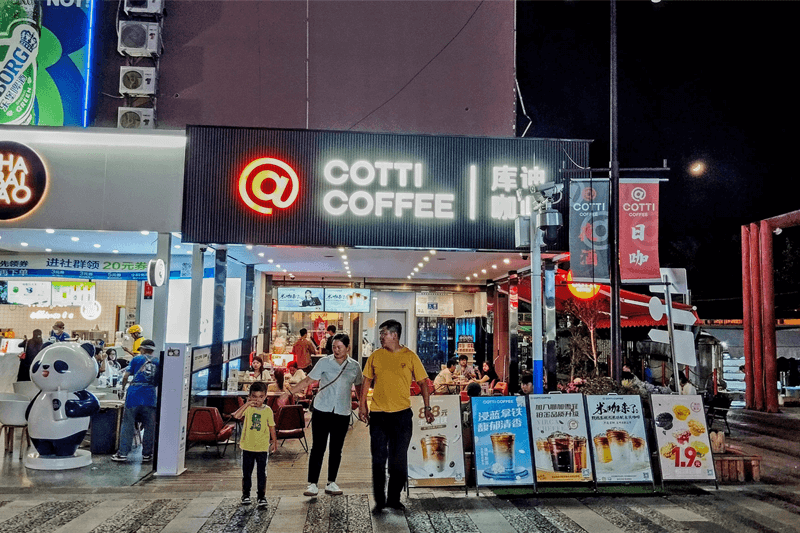 A Cotti Coffee store in Pu’er City, ChinaPhoto credit: Isabelle Mani
A Cotti Coffee store in Pu’er City, ChinaPhoto credit: Isabelle Mani
“BUSINESS PRACTICES ARE DEEPLY ROOTED IN BOTH CORPORATE HIERARCHY AND TRADITIONAL SOCIAL NETWORKS”
Felipe Cabrera, General Manager,Ad Astra Consulting
HOW FOREIGN BRANDS CAN SUCCEED IN CHINA
World Coffee Portal data shows China’s branded coffee shop market is forecast to exceed 86,300 outlets by the end of 2028 at growth of 11.7% CAGR. Even as competition grows, China presents a formidable growth opportunity for international coffee chains.
However, with the vast market moving at lightning pace with aggressively expanding domestic operators, gone are the days when Western brands can trade solely on prestige garnered at home.
“In the past, foreign coffee shop chains dominated the Chinese market, but now homegrown coffee shops have proliferated across the country and pose stiff competition for their international counterparts,” says Daxue Consulting’s Germano.
“Understanding and adapting to the preferences of younger, health-conscious consumers, as well as catering to diverse local tastes and preferences, is crucial” he adds.
In addition to understanding consumer preferences, operators will also need to gain a deep understanding of Chinese culture.“Business practices are deeply rooted in both corporate hierarchy and traditional social networks, with a fluid interchange between the two,” explains Cabrera, referring to the concept of ‘guanxi’, a term used in Chinese culture to describe an individual’s social network of mutually beneficial personal and business relationships.
“To succeed in this exceptionally fast-moving environment, one needs a crystal-clear philosophy, and ours is rooted in four fundamental cornerstones: true local relevance, continuous innovation, genuine community and absolute convenience,” says Tims China’s Yongchen.
This growing complexity necessitates a strategic approach as China’s market maturation demands new brands to be backed by substantial capital investments. “Capital mobility remains a major hurdle for brands western venturing into the Chinese market,” notes Pollack, highlighting the restrictions on internationally transferring the Renminbi.
Despite these hurdles Cabrera believes the Chinese market still represents a huge opportunity for new market entrants. “Chinese consumers present a high base and low penetration rate and the market has ample room for growth,” he says.
California-based Blue Bottle Coffee is one international brand seeking a share of China’s super premium specialty segment. The Nestlé-backed boutique operator opened its first store in Hong Kong in 2018 and in 2022 made its mainland China debut with a store in Shanghai that opened to seven-hour-long queues.
“We took our time entering China and we are still at the beginning of our journey and planting roots for the future,” says Blue Bottle CEO Karl Strovink.
For Strovink, understanding Chinese consumers’ strong willingness to try novel new experiences guides the brand’s positioning in the country. “Those acquainted with specialty coffee seek a consistent, high-quality experience but remain open to discovering new offerings and novelties”, he says, citing strong demand for seasonal lattes, such as the Saffron Vanilla Latte.
As with Blue Bottle stores around the world, integrating local heritage into store design has been essential in China. “Our Yutong Cafe, housed in a historic 1920s building, seamlessly blends old and new, while our Zhang Yuan Cafe draws inspiration from the region’s Shikumen heritage.
“While we have a global lens, our local teams are instrumental to our ability to integrate into new markets and offer locally relevant products.” One example is Blue Bottle’s Scallion Oil Waffels, which fuse the brand’s signature Liège waffle with local flavours.
“PERSONALISATION AND DIGITALISATION ARE EMBEDDED INTO CHINESE CONSUMERS’DAILY LIVES”
Yongchen Lu, CEO, Tims China
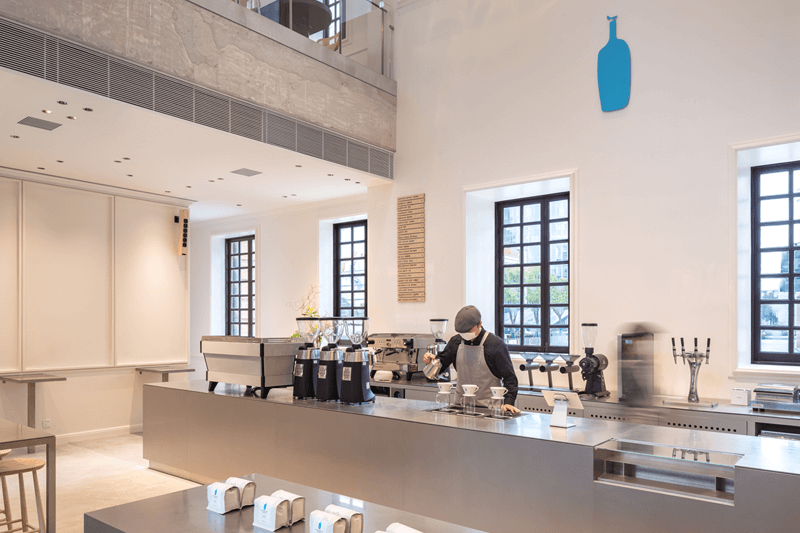 Blue Bottle Coffee’s Yutong Café in Shanghai, ChinaPhoto credit: Courtesy of Blue Bottle China
Blue Bottle Coffee’s Yutong Café in Shanghai, ChinaPhoto credit: Courtesy of Blue Bottle China
WHAT CHINESE CONSUMERS WANT
China’s branded coffee shop market has a rich ecosystem of apps to facilitate pre-ordering, delivery, payment and targeted promotions. More than 85% of Chinese consumers surveyed by World Coffee Portal in 2023 had pre-ordered or ordered coffee shop delivery in previous 12 months, with 57% preferencing beverage delivery over visiting a coffee shop.
Operated by tech giant Tencent, WeChat (or Weixin) is often described as China’s ‘everything app’ due to its multiple functions – from social media to e-commerce, dating and maps. The app has more than 810 million registered accounts in China and enables coffee chains to facilitate pre-ordering, delivery, payments and promotions.
WeChat operates food and beverage marketplace Meituan, which has around 75 million monthly active users and nearly three million annual takeaway coffee users in Shanghai alone. E-commerce giant Alibaba’s Alipay is a major competitor to Tencent’s WeChat and focuses solely on payments. Alibaba also offers a rival food and beverage app, Ele.me, which has around 68 million monthly active users.
Major coffee chains, including Luckin Coffee, Starbucks, McCafé, NOWWA, and Yongpu Coffee all collaborate with both Meituan and Ele.me for ordering, payment and marketing. Baidu Delivery, local services app Koubei, map provider, Amap and online shopping platform, Taobao are also used by coffee operators.
“Digital is one of the features that makes China the most compelling consumer market in the world. Personalisation and digitalisation are embedded into Chinese consumers’ daily lives and there is a high expectation for brands to respond accordingly,” says Tims China’s Yongchen.
It is not unusual in China to see young people carrying suitcases to change clothes and staging shoots to review coffee shops, explains Vivi Wang, a 37-year-old coffee shop entrepreneur and licensed Q Grader based in the Eastern province of Zhejiang. Social media platforms like WeChat, Yelp-styled Dianping and Xiaohongshu (Little Red Book) – a luxury lifestyle photo-centric app with 100 million users – have turned coffee shops into aspirational stages projected to millions. This user-generated content “plays a key role with users sharing reviews and recommendations,” Vivi adds.
Generation Z has grown up with coffee culture as a daily part of their lives and are today fuelling new viral coffee trends, including big brand collaborations and outlandish coffee recipes.
Unlike in the US and Europe, fruit-infused and flavoured coffee is commonplace in China. There is also a growing trend for brand collaborations, such as Luckin Coffee’s tie-up with Kweichow Moutai, a popular Chinese alcoholic spirit and Cotti Coffee’s Wuchang Rice Milk latte. Never one to be outdone, in February 2024 Starbucks introduced its very own pork-flavoured latte to celebrate Chinese New Year.
“Brands are incorporating Chinese cultural elements and ingredients into their products to appeal to young consumers who are increasingly culturally confident,” says Daxue Consulting’s Germano, referring to the concept of Guochao or ‘national wave’ that is hugely influencing how retail brands of all kinds do business in China.
“WE ARE STILL AT THE BEGINNING OF OUR JOURNEY AND PLANTING ROOTS FOR THE FUTURE”
Karl Strovink, CEO, Blue Bottle Coffee
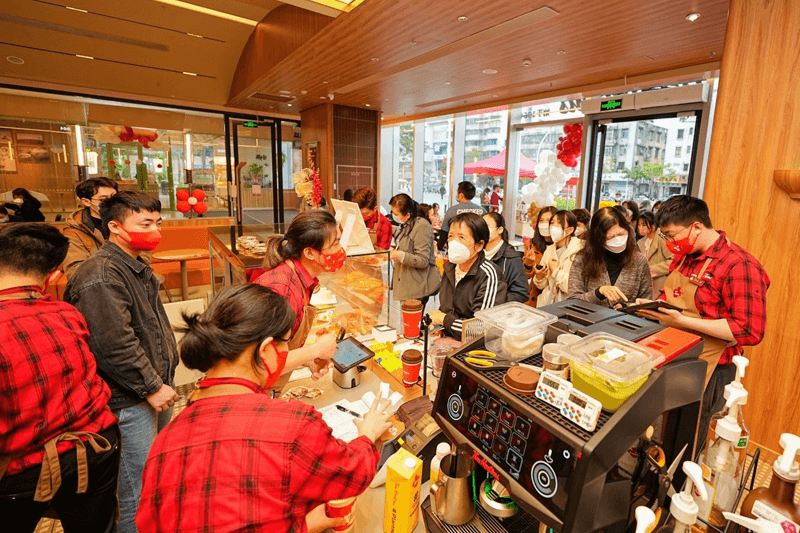 Long queues of customers at the opening of Tims China’s 600th store in Zhongshan, Guangdong Province, Shanghai, in January 2023Photo credit: Courtesy of Tims China
Long queues of customers at the opening of Tims China’s 600th store in Zhongshan, Guangdong Province, Shanghai, in January 2023Photo credit: Courtesy of Tims China
YUNNAN – THE GATEWAY TO CHINA’S SPECIALTY COFFEE BOOM
In little over 30 years the southwestern Chinese province of Yunnan has undergone a remarkable transformation from obscure agrarian economy to powerhouse of Chinese coffee farming. The region began producing coffee in the 1900s, when French missionaries imported the first plants from Vietnam.
However, it was not until 1988 that the Chinese government, World Bank, United Nations Development Programme and Nestlé jointly initiated a programme to modernise Yunnan’s coffee growing industry.
Since then, production has grown exponentially, and the region has developed into a national hub for coffee training and skills. In 1995 Yunnan produced some 58,000 60-kg bags, with exports reaching over 1.8 million bags by 2016, placing China within the top 20 global producers by volume.
That year Nestlé opened the Nescafé Coffee Centre in the city of Pu’er in Yunnan. Now a major trading and skills hub, the centre provides field management and processing training to almost 15,000 farmers, further cementing Yunnan’s coffee producing economy.
“We consistently purchase Yunnan coffee beans, ensuring fair rewards for local producers. Additionally, we're deeply committed to promoting regenerative agriculture practices, securing the future of coffee in the region”, says Sherry Zhao, Head of Brand Communication and Innovation for coffee at Nestlé China.
Today, Yunnan’s eight coffee growing sub-regions produce around 113,000 tonnes of coffee annually, over 98% of China’s total crop. The majority is destined for China’s vast commodity and instant coffee market, but the last decade has seen Yunnan specialty coffee grow to prominence.
International specialty roasters are increasingly sourcing Yunnan-origin coffee, including Barcelona’s Nomad and Dubai’s Cypher.
“We roasted Yunnan Coffees in 2023 and had great feedback from our customers. The coffee quickly sold out”, says Carlos Eduardo Bittencourt, CEO of Milan-based specialty coffee chain, Cafezal.
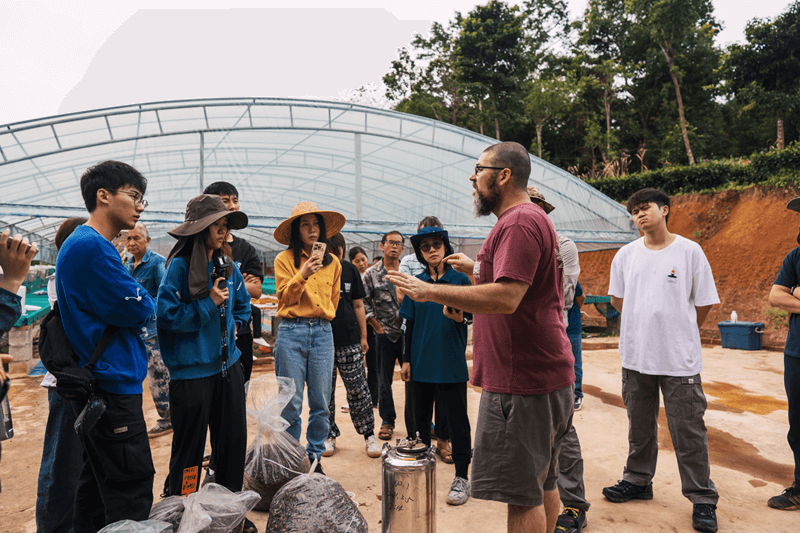 Torch Coffee’s Martin Pollack guiding a tour of specialty coffee enthusiasts at a coffee farm near Pu’er, Yunnan Province Photo credit: Courtesy of Torch Coffee
Torch Coffee’s Martin Pollack guiding a tour of specialty coffee enthusiasts at a coffee farm near Pu’er, Yunnan Province Photo credit: Courtesy of Torch Coffee
A NEW CHAPTER IN COFFEE HISTORY
With China firmly established as a global economic and cultural superpower, branded coffee chains entering the market will encounter clued-up consumers firmly pursuing their agenda and moulding coffee consumption in their own image.
Where Western operators were once met with intrigue and guaranteed long lines of curious customers, today’s brands will need to innovate at the same lightning pace as their Chinese competitors – and should also be asking what they can learn from them.
With homegrown coffee giants like Luckin Coffee, Cotti Coffee, There Was No Coffee and Mellower making strides into the wider Southeast Asian market, it is surely only a matter of time before Chinese brands start attracting their own long lines of curious consumers in the West.
To purchase the report or to make an enquiry, contact:
Ruth Thompson, Head of Partnerships rthompson@allegra.co.uk +44(0)20 7691 8800

























